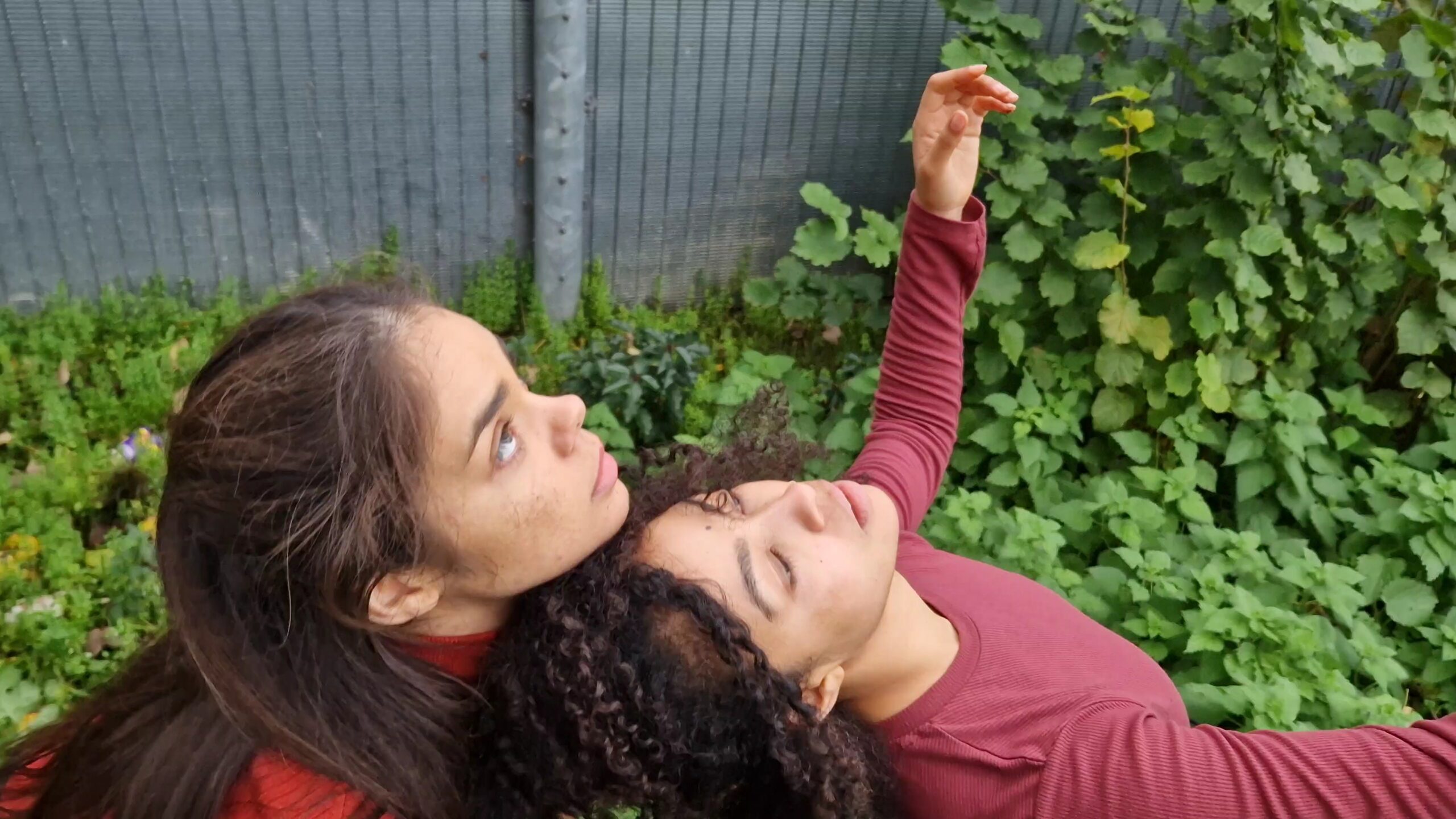Tuesdae Houston, Francesca Matthys and June Yuen Ting “and when she calls for justice”
Video with audio description
Video with closed captions
and when she calls for justice, a film by Tuesdae Houston, Francesca Matthys & June Yuen Ting
“and when she calls for justice” is an embodied documentary that seeks to highlight the lived experience of the struggles against apartheid, imprisonment and detention past and present as they are carried on the body of the South African diaspora and to bring attention to the choreography of political campaigns and protests fundamental to social change. By bringing together archival materials, activist interviews, spoken word and dance choreography, this film hopes to invite its viewers to consider what the Anti-Apartheid Movement in the UK means today in the context of the anti-racist activism against immigration detention, border violence, patriarchy and the ongoing aftermath of colonialism.


“In a 1982 newsletter published by the Anti-Apartheid Women’s Committee in London, activists had observed and analysed the way racism lay at the core of both the Apartheid system in South Africa and discriminatory immigration laws in Britain. They drew no conclusion about the comparability between the two, yet their commitment to fighting injustice transnationally has guided us throughout the process of making this film. A phrase borrowed from a pamphlet published by the Anti-Apartheid Women’s Committee, “And When She Calls for Justice” asks us what responsibilities today we have as the keepers of this legacy, and invites viewers to consider that the time for justice is whenever we demand it. Anti-Apartheid is now! “
June Yuen Ting
Cover and headline from Anti-Apartheid Movement Womens’ Committee Newsletter, No.3, July 1982 (Courtesy Anti-Apartheid Movement Archives)

Beginning with the provocation “All Immigration Detainees Are Political Prisoners,” the artists hope that the film asks the viewer to consider how, in what form, does the legacy of the Anti-Apartheid Movement in the UK continue today in the fight for migrant justice?
During research and development for the piece the artists spent time exploring archival materials and engaging with stories – historical and contemporary – of struggles faced by migrants, activists and political refugees. The story of the activist Dulcie September, a South African from the Cape Coloured community and former political prisoner, who was incarcerated and tortured under the apartheid regime and who came in exile to England in the 1970s resonated deeply with the artists and became a significant inspiration and basis for a creative piece of dance-film.
(PICTURED): Dulcie September pictured on cover of pamphlet published by the African National Congress after her assassination, courtesy Anti-Apartheid Movement Archives)


Tuesdae Houston, Francesca Matthys and June Yuen Ting “and when she calls for justice”
Tuesdae Houston, Francesca Matthys & June Yuen Ting’s Artists Statement:
At the inception of this project, June and Tuesdae spoke about the relevance of The Liliesleaf Trust UK’s work, making visible the heritage of the liberation struggle, as well as manifestations of anti-racist activism in relation to the current immigration situation in England. Their starting point was to investigate the stories of women who have made the journey to England seeking asylum in the past and present. Soon after inception they took on another movement artist, Francesca, a South African woman who also travelled to London in her adult life for academic reasons. Tuesdae and Francesca connect on the journeys they have made and touch on what it feels like being young coloured* women in London, the complexities that come with embracing new culture and losing parts of yourself. They agree that this project is one of stories, stories from women of colour who find themselves in foreign lands. This stirs up feelings to investigate, which they will bring into the studio, to make work.
*in this context, coloured refers to people of the Cape Coloured community, a distinct ethnic group found primarily in the Western Cape province of South Africa. Cape Coloured culture, cultural traditions and practices is known for its unique blend of African, European and Asian cultural influences as well as strong traditions of artistic expression including music, dance, cuisine and other forms.
Artist reflections:
From Tuesdae
There was a moment when I was standing outside the [detention] centre and I heard someone on the inside. It was compelling. That person had a journey, a story and I was on the outside, trying to make a film about her. And yet I probably could never fully feel her feelings the way she has. Or understand the pain she’s been through. And she was one of the many inside that huge building. That cared so little about her being able to live a life that she deserved. She deserved better. She deserved more from us as humans. From me as an artist. And I felt afraid. Who am i? What can I do? For you umama, usisi. When you called… We failed you.
From Francesca
It’s challenging being an artist , making work about real bodies, real experiences and real lives who have travelled across the seas and felt the cold beneath their feet. As we stood outside the concealed building, I too felt the cold beneath my feet, vulnerable to the bodies that decide. As the cold air danced with us in our liminal space. I pondered on freedom that became like a warm illusion, the caucus of birds that gathered above our heads and the dog that paced around bound by the grips of its keeper. Making this work evoked a lot of emotions within me on the day. It asked of me to be brave, to persevere, to listen, to imagine what it must have been like for the many women who have fought for freedom in many ways. Whose bodies have become collateral. Leaving me feeling uncertain as to how to move on?
From June
What we are trying to do is to pose an open question to viewers–What does the legacy of the Anti-Apartheid Movement mean to us today in contemporary Britain? For us, this legacy carries the anti-colonial, anti-racist lineage of the South African diaspora in the UK–which Tuesdae and Francesca are a part of. Standing in front of South Africa House, facing Trafalgar Square–where Dulcie September and other activists have taken a stance for justice from the place of the diaspora–this legacy of struggle across and beyond borders felt at once so concrete and so elusive…This indefinite sense of knowing and not knowing followed us when it came to deciding on a name for the film. We have considered “All Immigration Detainees Are Political Prisoners”–a statement that feels direct, confrontational and powerful. Yet with the complexities of each historical moment and its political context, we worried that no easy parallel or analogy can be drawn without conflating or collapsing the specificity and significance of the movement to liberate Black and Coloured political prisoners under South Africa’s Apartheid regime on the one hand, and the present-day activism to free migrants and refugees held in immigration detention in the UK on the other… [yet] the connection between the two fights was already made by activists themselves in the UK Anti-Apartheid Movement 40 years ago.
Choreography for the piece was created by Tuesdae Houston and Francesca Matthys, with dramaturgical support from June Yuen Ting, Videography by June Yuen Ting, Tuesdae Houston and Francesca Matthys, Video editing and post-production by June Yuen Ting, Dance/Performance by Tuesdae Houston and Francesca Matthys, Writing by Tuesdae Houston.
Filmed on location outside South Africa House, Trafalgar Square, London and on a public footpath outside Harmondsworth Immigration Removal Centre, Hillingdon, London
Music for the piece, reproduced with permission:
‘Sonatina-Abdi’, Composed by Grant McLachlan, performed by Leon Bosch and Rebecca Omordia. Recorded by Richard Hughes, Meridian Records
And
‘Cape Town’, Composed and produced by Ian Hubball


